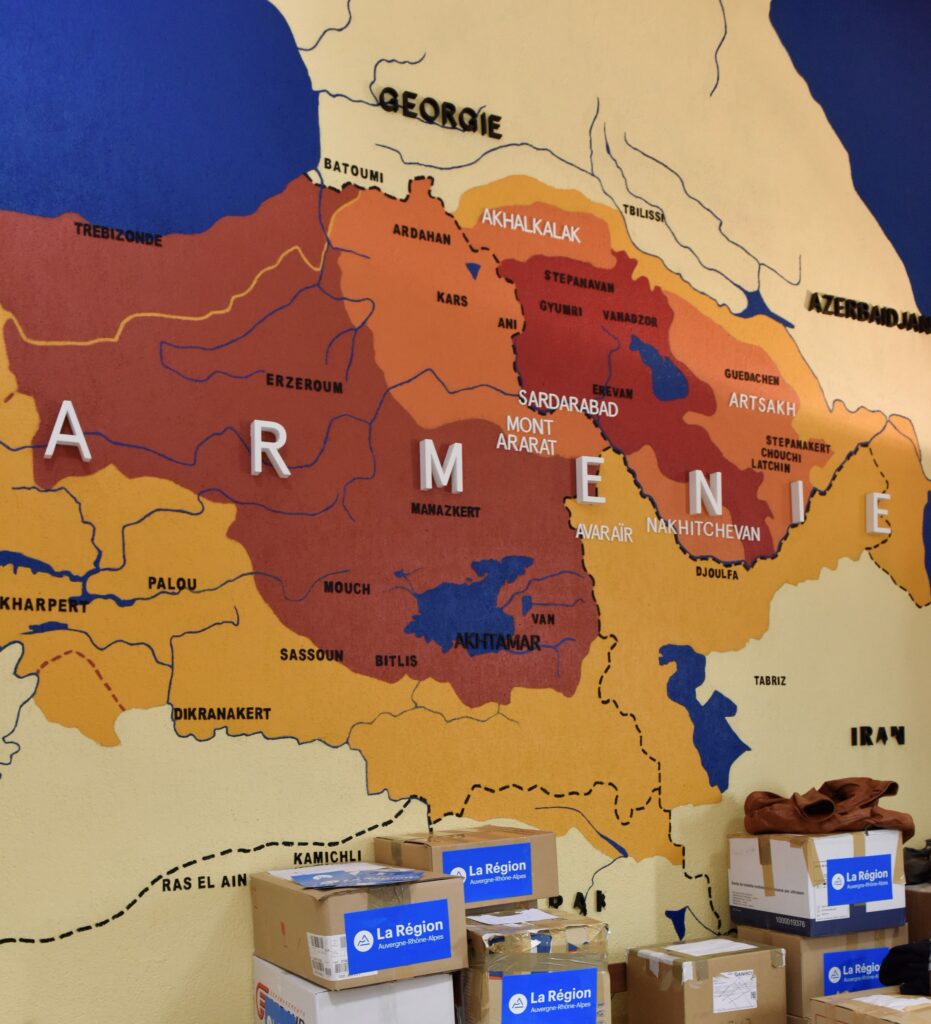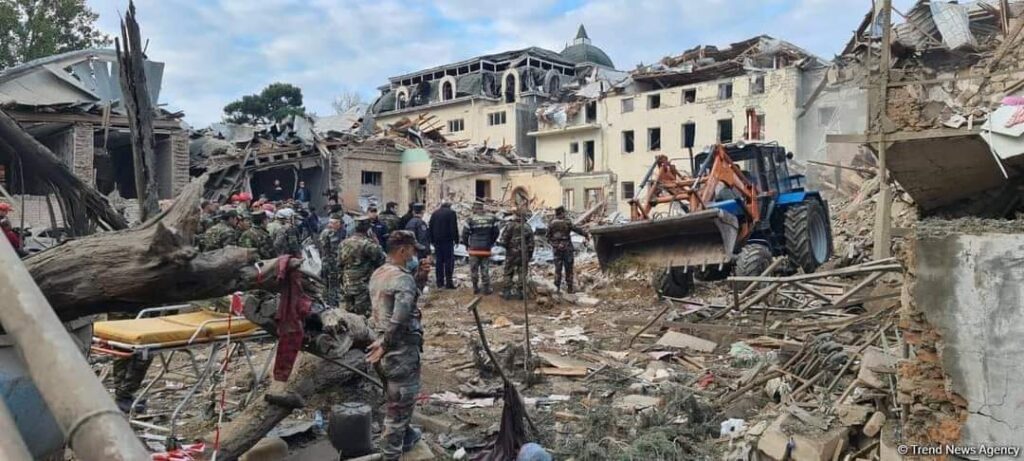In a response to Rafik Grigoryan’s article, “Should Estonia be concerned about the situation in Nagorno-Karabakh”, Elvin Abbasli, a Tallinn-based Azerbaijani expat asks, why would NATO members worsen their relations with Turkey, who has the second-biggest military in the alliance, and says that Armenia should find another shoulder to cry on.
The article of Dr Rafik Grigoryan, titled “Should Estonia be concerned about the situation in Nagorno-Karabakh?” and published in Estonian World, has really surprised me. The opinion piece, written by a person who doesn’t have basic knowledge of geopolitics, international relations and even the foreign policy inclinations of the Republic of Estonia makes an absurd demand: NATO members – including Estonia – should either take full responsibility for Turkey’s actions or must deprive Turkey of the membership in NATO. The author also does his best to convince the Estonian public to accept Armenia as Dr Jekyll while hiding the truth about Mr Hyde.
The Russian satellite state in the South Caucasus
The proposal prompts an Estonian reader to ask the question, why should the Republic of Estonia and other member nations of NATO worsen or breach their relations with another member – Turkey – who has the second-biggest military in the alliance? It is not a secret that the biggest threat to NATO is the expansionist Russia that tries to challenge the former. As an alternative to NATO in the post-Soviet space, Russia has created the Collective Security Treaty Organisation (“CSTO”), one of the active members of which is Armenia (Azerbaijan is not the member of the military alliance).
Additionally, according to the fifth edition of the Estonian Foreign Intelligence Service’s annual report, “The International Security and Estonia”, “The main external threat to Estonia’s security is neighbouring Russia, whose leadership is aggressively and actively opposed to the democratic world order”. Taking into account all of these, there is no reason to support the author’s suggestions. Furthermore, if Dr Grigoryan really wants to find satellites in the South Caucasus, he has to start his search in his historic homeland, namely Armenia. Being a Russian satellite state in NATO’s borders, Armenia also hosts a Russian military base in Gyumri and poses a threat to the military union.
Armenia is also a member of the Eurasian Economic Union, the Russian alternative to the EU. Speaking about the economic dependence of Yerevan from Moscow, the latter possesses the key sectors of the Armenian economy. Besides the close energy relationship, Russians also own significant parts of Armenia’s transport and telecommunications sectors.
The new government of Armenia and the Armenian lobby in the West, in the example of Dr Grigoryan, think they can convince the world that Armenia can really sit on two chairs by having very close relations with Russia and getting the sympathy of the West at the same time. But to their surprise, the politicians in Brussels, Washington and other major cities are fully aware of the real picture.
In addition, Armenia also pays to Russia with its loyalty in the international arena. When the UN General Assembly adopted the Resolution 68/262 on 27 March 2014 and recognised the territorial integrity of Ukraine in response to the Russian annexation of Crimea, Armenia was one of the 11 countries voting against. Yerevan has also repeatedly voted against or abstained from the United Nations resolutions on Abkhazia, demanding the right of return of all displaced persons and refugees to Georgia’s occupied regions. Hence, there is a need to formulate the question in a different form: Why should Estonia, having a completely different path, values and foreign policy directions, try to please Armenia? In what situations Armenia contributed to the accepted Western values and supported them?

The use of religious differences as a propaganda tool is a simple form of populism
I think the author hopes that the international community, especially the EU, including Estonia, should assist Armenia to continue its occupation policies just because Armenians are Christians, with Armenia being the “last outpost of the Christianity in the East”. But he tends to forget that the Republic of Estonia has a secular political system and the role of the religion in the society is quite limited. The same is also true for Azerbaijan, the country that is quite often targeted as a “Muslim adversary” by the Armenian officials.
Attaching religious connotations to the conflict was favourable for Armenia and heavily used as a propaganda tool in the Western world during the outbreak of the conflict in the 1990s. But the world has changed and using such outdated notions can attract only far-right radicals and Islamophobic conservatives in the West. The support shown to Armenia by the AfD, a far-right German political party, and the populist politicians such as Geert Wilders during the recent escalation can be a good example of this.
This argument is also irrelevant if you closely look at the foreign relations of Armenia. Armenia has very close bonds with Iran and is supported by some of the Islamic Arab countries, such as the United Arab Emirates, whereas Georgia and Israel are considered Azerbaijan’s close partners.
When it comes to the alleged terrorist threat from Azerbaijan, I would just recommend my readers to google ASALA, JCAG, ARA or 1983 Orly airport attack, 1985 Paris attack, 1983 Grand Bazaar bombing in Turkey, 1981 Madrid airport attacks, 1990 Tbilisi-Agdam bus bombing etc.
Armenia reminds of a person with cognitive dissonance when it comes to the Nagorno-Karabakh conflict
A witty reader can also see the phrase, “Artsakh in the disputed Nagorno-Karabakh territory” in the above-mentioned article. What the author means by that remains unclear. Nagorno-Karabakh is an internationally recognised territory of the Republic of Azerbaijan with seven adjacent regions, occupied by the Armenian forces, the fact of which has been affirmed by the UN Security Council Resolutions 822, 853, 874 and 884, adopted in 1992, the Council of Europe Parliamentary Assembly (PACE) Resolution 1416 (2005) and other international and regional documents. The author does not even refer to any international norms to justify the claims of Armenia over the so-called “Artsakh Republic” and expects the Estonian government, which recognises the territorial integrity of Azerbaijan, to help the occupying force maintain status quo.
Unfortunately, for the government of Armenia, peace is considered the reconciliation of the Azerbaijani society with the occupation fact. Armenia does not even want to return the seven regions outside the Nagorno-Karabakh Autonomous Region that were inhabited mostly by Azerbaijanis before the conflict started (my own aunt has been living in Baku as an IDP, fleeing her home in Lachin, Karabakh, almost 30 years ago).
The statements by the Armenian officials on Nagorno-Karabakh are also often contradictory. In his recent infamous speech, the Armenian prime minister, Nikol Pashinyan, declared that “Nagorno-Karabakh is Armenia, and that is all”. But at the same time, Armenia insists that the conflict is happening between the self-proclaimed independent Nagorno-Karabakh Republic and Azerbaijan. The funny fact is that the Nagorno-Karabakh Republic is recognised only by Transnistria, Abkhazia and South Ossetia, separatist regions in the post-Soviet space. Armenia officially does not recognise it as the independent state.
If Armenia does not recognise the breakaway region as an independent state and officially sees it as a part of Azerbaijan, then why does the author seek assistance to Armenia in this conflict? The logical conclusion rising from this is the fact of the presence of Armenia in the conflict as an active party, considering its military involvement in Nagorno-Karabakh, economic assistance to the puppet regime etc.
In the end, coming from the famous idiom, I would advise the Armenian government to find another shoulder to cry on, possibly 1,000 kilometres to the south-east from Tallinn, as it always did, and not to involve Estonia in the actions undermining its foreign policy goals and diplomacy.
The opinions in this article are those of the author. Cover: The death toll as a result of the missile attack on Ganja, the second biggest city in Azerbaijan, by the Armenian forces is 10 as for now. Photo credit: Trend News Agency.

